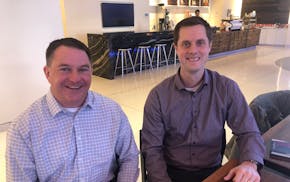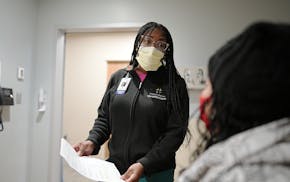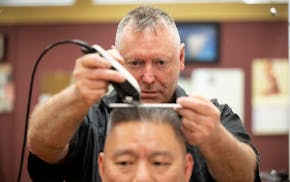Anne Patterson, a former California technology executive, is doubling down on her Twin Cities solar-oven business with the introduction of a new, smaller model.
She believes it will generate the increased sales needed to produce more of the family-sized versions she and nonprofit partners subsidize to get to low-income people in places such as Haiti and other deforested parts of developing countries.
Patterson, 65, became enchanted with the Solavore Sport solar cooker she bought in 2012 from the former St. Paul nonprofit that was running out of gas after more than a decade.
So, she and minority partners bought the enterprise. They have invested, including the acquisition, something approaching $1 million to bring Solavore to a scalable model that Patterson believes will accelerate in this, her fourth full year of ownership.
"Our Solavore Go will be launched on Kickstarter [this] week," she said. "This [smaller] product is totally designed for the developed world and this will be the financial engine that funds our work in the developing world."
The Solavore Go!, designed by a Minneapolis firm, is targeted at the huge market of environmentally oriented campers who have asked for something smaller, to cook for one or two people, and which doesn't require propane or wood.
It will sell for $149, vs. $269 for the larger, heavier Solar Sport that Americans use on their decks and otherwise, and which is in demand in developing countries, where women usually are cooking in rural areas for extended families. It features two three-quart pots.
Solavore, Latin for "devour the sun," targets with its Solar Go! the growing market of environmentalists for easier-than-you-think solar cooking that can heat to 275 degrees.
Solavore is also a social enterprise that seeks to provide thousands of low-cost cookers to women in developing countries who walk miles in search of wood and cook over dangerous wood coals in their smoky huts. Their homelands also often are devastated by deforestation.
"I care about the environment and I care about women," Patterson told me in 2016.
Patterson, who has a master's degree in mathematics and music, worked around the world in operations for the likes of Hewlett-Packard, 3Com and Next Computer, where she once reported to the late Steve Jobs before he returned to Apple.
She retired several years ago and became fascinated with solar cooking, thanks to a solar oven she acquired from the former Solar Oven Society.
Patterson has seen the difference in health and local environment when families in deforested areas of Haiti or Kenya, start replanting trees and cooking with solar ovens; essentially slow cookers heated by the sun and intensified by aluminum reflectors.
And Solavore works with a host of nonprofit organizations to finance and bring ovens where needed.
In anticipation of increased production this year, Solavore moved manufacturing from its own small space in St. Paul to the southeast Minneapolis plant of Emerge Enterprises, a nonprofit manufacturer and assembler.
Emerge's workforce includes some workers with criminal and chemical dependency histories. They are paid $10 to $15 an hour as they acquire skills, build a work history and often move on to a pool of area manufacturers within a year or two.
"Emerge is an ideal partner for Solavore," Patterson said. "Scalable, flexible manufacturing capacity is key to a seasonal business like Solavore.
The caliber of the management team at Emerge was a critical factor. Being 'mission-aligned' brings valuable energy to our employees and our partnership."
At times, five or six Solavore-trained Emerge employees work on solar ovens under the watchful eye of Solavore-line lead Jacqueline Carmichael.
Solavore last year broke even on about $500,000 in sales. About 10 percent of revenue was subsidized sales of about 200 solar ovens to Haiti, Puerto Rico and Africa.
Patterson lives in Connecticut and is a regular visitor to the Twin Cities.
She believes the new product will drive sales to $2 million within three years.
And she's contemplating spinning off the developing-world outreach as a separate nonprofit that can be supported by profits from the main business, as well as philanthropic partners.
"We are active in four projects in Haiti, including one with the Haiti Adolescent Girls Network, which uses our solar ovens as part of a micro-enterprise training program for at-risk teen girls. Each of the girls in the program will use a Solavore Sport solar oven to cook food and bake bread and cakes that they will in turn sell at market, teaching them business basics and potentially earning higher gross margin by avoiding the astronomical cost of charcoal.
"Most recently … in Puerto Rico, where rebuilding with resiliency is as important a providing relief to the thousands of families still without power, Solavore is co-hosting a crowdfunding campaign on Generosity.com where the initial goal of funding 25 ovens was met in one week. We have an overall goal of 100 ovens. Solar-oven distribution and training, which begins next month, will follow the path of hurricane Maria …" from fishing villages in the south to mountains in the north.
Neal St. Anthony has been a Star Tribune business columnist and reporter since 1984. He can be contacted at nstanthony@startribune.com.

St. Anthony: 'Patient' investing paying off for St. Paul's Hill Capital

Jennifer Smith, leader of Burnsville's Innovative Office Solutions, has died

St. Anthony: Medical professions in Minnesota need more people of color in their ranks


